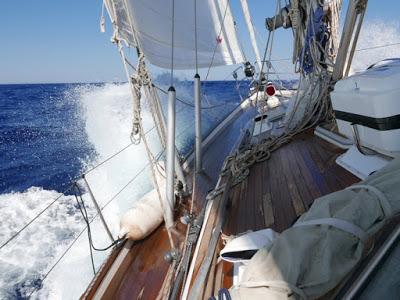 Foto de Arturo Pérez Reverte
Foto de Arturo Pérez Reverte
Hace pocos días recibí un zasca en Twitter por usar una metáfora que daba lugar a una mala interpretación. Por mucho que queramos el lenguaje no es totalmente controlable, dado que toda comunicación tiene una parte que depende del emisor y otra del receptor. Ese metamensaje nos suele meter en líos excepto en matemáticas donde no ha lugar.
En cualquier caso la situación me ayudó a reflexionar sobre mis metáforas y narrativas que últimamente tienen un cariz de derrumbe. Es verdad que este año está siendo aciago para los profesionales sanitarios al enfrentarnos a una situación nueva que ha venido acompañada de intensas emociones.
Primero fueron la sorpresa y el miedo. Durante meses nos enfrentamos a una enfermedad infecciosa sin medidas de protección, sin pruebas diagnósticas y sin tratamiento. Luego vino el enfado tras mucho tiempo de gestión errática y falta de liderazgo sanitario. Finalmente el cansancio y la desesperanza al comprobar que volvemos a la casilla de salida habiendo aparentemente aprendido poco.
Por estas razones he usado en muchas ocasiones la imagen del barco hundiéndose, narrativa que llevo compartiendo años junto a otros muchos compañeros. En Atención Primaria llevamos décadas sufriendo limitación severa de la inversión y una gestión bastante discutible que ha ido empeorando año tras año las condiciones del servicio. Da la sensación de que un tejido tan dañado termina por romper las pocas costuras que le quedan cuando uno es testigo de barbaridades como las que está pasando este año en el centro de salud de el Álamo, en Madrid donde se ha permitido que dos o tres médicas atiendan siete consultas a la vez.
Hoy me levanté con una nueva imagen que tal vez pueda sustituir a la anterior. La de un barco de vela de dos palos navegando con fuerte marejada. Y tal vez nos pueda ser más operativa. Es verdad que la organización de un equipo de Atención Primaria se asemeja en parte a una tripulación con distintos roles, también que tanto el barco tiene sus problemas estructurales y la marinería es algo corta. Pero la tormenta es la que hay, la peor que hayamos visto en mucho tiempo, entramos en mar gruesa.
Por eso la queja y la denuncia sirven de poco cuando las olas son del tamaño de una casa. No queda más remedio que hacer todo lo que esté en nuestra mano y, como bien saben los marinos, rezar quien pueda. Para ello la palabra clave es PRIORIZAR. Cada barco de esta armada sanitaria tendrá que hacer lo propio sin demorarse a esperar instrucciones del alto almirantazgo que llegan mal y tarde.
#COVID_19 No se vosotros, pero yo estoy empezando a hacerme la lista de prioridades asistenciales (paliativos, frágiles y crónicos graves). Lo siento por lo que no llegue a ser atendido, pero es que no pienso morir por el intento......y ya estamos sobrepasando todos los límites https://t.co/FOQgdTLGI5 — Joaquin Morera (@joaqmorera) August 6, 2020Necesitamos priorizar:
- El cambio de actitud y narrativas.
- La seguridad de los pacientes.
- La seguridad del personal.
- La atención de los más vulnerables o graves.
- La atención de la patología urgente severa.
Por otra parte no creo que haya que abandonar:
- La progresiva toma de conciencia de nuestra situación.
- La comunicación y coordinación entre profesionales y sociedad.
- La visibilización y denuncia de la situación ante nuestros responsables y ante la sociedad.
- La vía legal, cuando se crucen líneas rojas.
- La vía sindical, con acciones de alguna contundencia.
Ayer vivimos un día de fuertes tormentas en mi zona. Las recibí con alegría y creo que me han ayudado a ponerme en mi sitio. Creo que es bueno, sin querer nos descolocamos o permitimos que la vida nos descoloque. Hoy, con un día fresco con la tierra aún mojada, parece que la esperanza es una posibilidad, pero que no nos pille con los brazos cruzados.
 Change of attitude, change of narrative.
Change of attitude, change of narrative.A few days ago I got a buzz on Twitter for using a metaphor that led to misinterpretation. As much as we want language, it is not totally controllable, since all communication has a part that depends on the sender and another part on the receiver. That meta-message usually gets us into trouble except in math where there is no place to missinterpretation.
In any case, the situation helped me to reflect on my metaphors and narratives, which lately have a collapsing aspect. It is true that this year is proving to be a dark time for health professionals as we face a new situation that has been accompanied by intense emotions.
First there was surprise and fear. For months we faced an infectious disease without protective measures, without diagnostic tests and without treatment. Then came anger after a long time of erratic management and lack of health leadership. Finally, there was the tiredness and hopelessness of finding ourselves back at square one having apparently learned little.
For these reasons I have used on many occasions the image of the sinking ship, a narrative that I have shared for years with many other colleagues. In Primary Health Care we have been suffering for decades from severe limitations on investment and quite questionable management that has worsened the conditions of service year after year. It seems that such damaged tissue ends up breaking the few seams it has left when one witnesses atrocities such as those taking place this year at the Alamo health centre in Madrid where two or three doctors have been allowed to attend seven consultations at a time.
Today I woke up with a new image that could perhaps replace the previous one. That of a two-masted sailing boat sailing in a strong swell. And maybe it can be more operational for us. It's true that the organisation of a primary care team resembles in part a crew with different roles, but it's also true that the boat has its structural problems and the seamanship is a bit short. But the storm is there, the worst we've seen in a long time, we're going into heavy seas.
That's why complaining and denouncing is of little use when the waves are the size of a house. We have no choice but to do everything we can and, as the sailors know, to pray. The key word here is PRIORITY. Every ship in this sanitary navy will have to do the same without delaying to wait for instructions from the high admiralty that arrive badly and late.
- The change of attitude and narratives.
- Patient safety.
- The safety of the staff.
- The care of the most vulnerable or seriously ill.
- The attention of the severe urgent pathology.
And everything else should be secondary. We cannot cover everything, especially in a summer scenario with a 50% staff, many exhausted professionals and a perspective of worsening epidemiological situation.
- The progressive awareness of our situation.
- Communication and coordination between professionals and society.
- Making the situation visible and denouncing it to our leaders and to society.
- The legal way, when red lines are crossed.
- The union way, with actions of some forcefulness.
Yesterday we had strong summer storms in my area. I received them with joy and I believe that they have helped me to put myself in my place. We need to tune up ourselves from time to time. Today, with a cool day and the ground still wet, it seems that hope is a possibility, but not to be caught with our arms crossed.
 態度改變,敘述改變。
態度改變,敘述改變。自動翻譯,對錯誤感到抱歉。
幾天前,我因使用導致誤解的隱喻而在社交網絡上風靡一時。就我們想要的語言而言,它並不是完全可控的,因為所有通信的一部分取決於發送者,而另一部分取決於接收者。這種元消息通常使我們陷入困境,除非在數學中沒有遺漏解釋的地方。
我們需要確定優先級:
態度和敘述的改變。
患者安全。工作人員的安全。
最脆弱或重病的護理。
重症急症的注意。
其他都應該是次要的。我們無法涵蓋所有內容,尤其是在夏季只有50%員工,許多精疲力竭的專業人員以及流行病形勢惡化的情況下。
另一方面,我不認為我們應該放棄:
使情況可見並向我們的領導人和社會譴責。
越過紅線的合法方法。
聯合的方式,帶有一些有力的行動。
